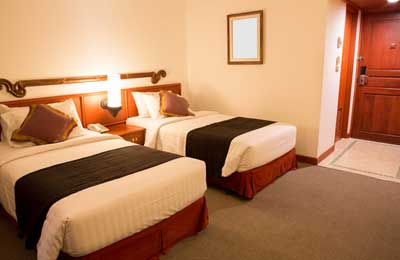
Mena hotels see 8pc rise in revenue per room
Dubai, January 28, 2013
End-of-year hotel results for 2012 reveal a steady recovery for the Mena region, with more than 8 per cent RevPAR (revenue per available room) growth over the corresponding period last year, a report said.
This was driven by a 4.2 point increase in occupancy rate (OR) and 1 per cent in average daily rate (ADR), according to top travel and lodging services company MKG Hospitality’s market monitoring database Hotel-CompSet.
“Of course this change in yearly performance indicators is mainly due to comparisons with the severely depressed figures this time last year, a time when much of the region was still in turmoil from the Arab Spring and civil unrests,” said Vanguelis Panayotis, director of Development, MKG Hospitality.
“So, although there is recovery shown, the situation is still quite fragile and certainly susceptible to another dip.”
Algeria, Tunisia, Jordan, Bahrain and Yemen recorded a significant turnaround in RevPAR from the major drop this time last year when political instability plagued the region’s sector. Despite on-going demonstrations, Egypt also managed an increase in demand, and in doing so, pushed RevPAR up by over 11 per cent in 2012, the report said.
Hoteliers here are reduced average prices in order to stimulate demand and reverse the poor results from the previous year. Morocco remained more or less stable, which actually represents reasonable recovery considering the major decline it experienced at the beginning of the year. If all goes well, the country should continue its path towards full recovery, according to the report.
Oman remained more or less stable, while Qatar and Lebanon recorded negative upon negative. Qatar’s decline was mainly due to continued increase in supply, but the Lebanon market is directly influenced by the conflict in Syria.
Many countries still have strict travel warning to the country, while most GCC governments – a traditional key source market – are still preventing citizens from travelling to Lebanon (ban in place since August).
Meanwhile, Algeria, Turkey, Saudi Arabia, the UAE and to a lesser extent Kuwait all posted growth on-growth.
“These markets maintained stability, and have strong business segments. Their performances have been consistent throughout the year, and no doubt even managed to attract demand that would have otherwise gone elsewhere in the region,” said Panayotis.
In the GCC, Saudi Arabia posted the best change, with RevPAR up by 12 per cent for the year. Strong business traffic and MICE, as well as exceptional results during religious holidays are driving momentum, the report said.
The UAE also continued steady growth (up by 4.6 per cent), driven by higher ADR results, especially in Dubai with its strong leisure appeal and consistent MICE segments.
“No doubt, the region still has many challenges to confront; the most obvious being political stability in some troubled country markets and overall regaining credibility as a safe and attractive destination for travellers. At the same time, economic woes in key source markets Europe and North America will certainly not help to drive new tourism activity to the region at a time when needed most,” continued Panayotis.
“As such, markets must continue to battle and compete globally, attempting to stimulate purchasing behaviour during a period of such low consumption in business and leisure sectors. Intra-regional travel will also be a high priority in order to make up the difference.” – TradeArabia News Service







